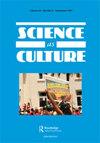Security knowledges: circulation, control, and responsible research and innovation in EU border management
IF 2.4
3区 哲学
Q1 CULTURAL STUDIES
引用次数: 1
Abstract
ABSTRACT The knowledge emerging from research funded by the European Union (EU) through its Framework Programmes for Research and Innovation and other funding streams is significantly shaped by different forms of epistemic control exerted by the EU itself. Through the promotion of industry-research-policy cooperation in EU-funded research, and in light of the growing importance attached to ‘impact,’ this knowledge will often contribute to bureaucratic decisions taken by the European Commission, Frontex, the EU Agency for the Operational Management of Large-Scale IT Systems (eu-LISA), and other agencies tasked with border security and control. The circular dynamics surrounding knowledge production, from the calls for proposals to the results of the research, are intrinsically political and contribute to exposing the limits of the EU-promoted principle of Responsible Research and Innovation. Additionally, and due to the centrality of EU funding in the research outlook in contemporary Europe, these processes raise wider questions about the sociology of the academic fields that this article relates to: critical border studies, critical security studies, and science and technology studies. How can we interpret the interplays between the EU’s policies fostering development and integration of border security technologies, on the one hand, and the Union’s broader principles for free and open research and innovation? Through the use of autoethnographic vignettes, and mediated by an expanded Foucauldian understanding of circulation as a technology of control with performative effects, the article sheds light on the dynamics surrounding knowledge production in the field of border technologies in an EU context.安全知识:流通,控制,负责任的研究和创新在欧盟边境管理
摘要欧盟通过其研究与创新框架计划和其他资金流资助的研究所产生的知识在很大程度上受到欧盟自身不同形式的认识控制的影响。通过在欧盟资助的研究中促进行业研究政策合作,并鉴于对“影响”的日益重视,这些知识通常将有助于欧盟委员会、Frontex、欧盟大规模IT系统运营管理局(EU LISA)和其他负责边境安全和控制的机构做出官僚决策。围绕知识生产的循环动态,从提案征集到研究结果,本质上是政治性的,有助于暴露欧盟倡导的负责任研究和创新原则的局限性。此外,由于欧盟资金在当代欧洲研究前景中的中心地位,这些过程对本文所涉及的学术领域的社会学提出了更广泛的问题:关键边界研究、关键安全研究和科学技术研究。一方面,我们如何解读欧盟促进边境安全技术开发和整合的政策与欧盟自由开放的研究和创新的更广泛原则之间的相互作用?通过使用民族志小插曲,并通过扩大傅对流通作为一种具有表演效果的控制技术的理解,文章揭示了欧盟背景下边境技术领域知识生产的动态。
本文章由计算机程序翻译,如有差异,请以英文原文为准。
求助全文
约1分钟内获得全文
求助全文
来源期刊

Science As Culture
Multiple-
CiteScore
5.20
自引率
3.80%
发文量
28
期刊介绍:
Our culture is a scientific one, defining what is natural and what is rational. Its values can be seen in what are sought out as facts and made as artefacts, what are designed as processes and products, and what are forged as weapons and filmed as wonders. In our daily experience, power is exercised through expertise, e.g. in science, technology and medicine. Science as Culture explores how all these shape the values which contend for influence over the wider society. Science mediates our cultural experience. It increasingly defines what it is to be a person, through genetics, medicine and information technology. Its values get embodied and naturalized in concepts, techniques, research priorities, gadgets and advertising. Many films, artworks and novels express popular concerns about these developments. In a society where icons of progress are drawn from science, technology and medicine, they are either celebrated or demonised. Often their progress is feared as ’unnatural’, while their critics are labelled ’irrational’. Public concerns are rebuffed by ostensibly value-neutral experts and positivist polemics. Yet the culture of science is open to study like any other culture. Cultural studies analyses the role of expertise throughout society. Many journals address the history, philosophy and social studies of science, its popularisation, and the public understanding of society.
 求助内容:
求助内容: 应助结果提醒方式:
应助结果提醒方式:


